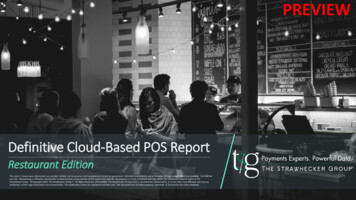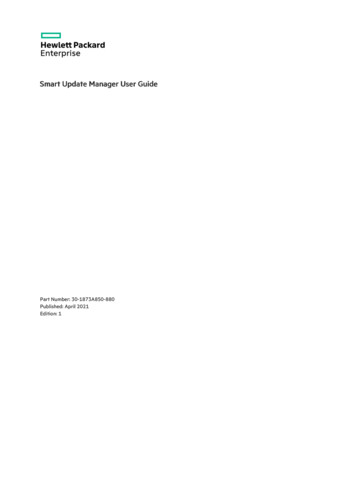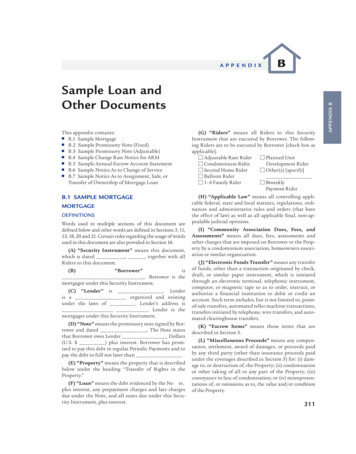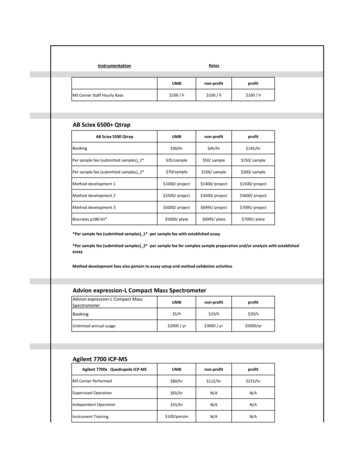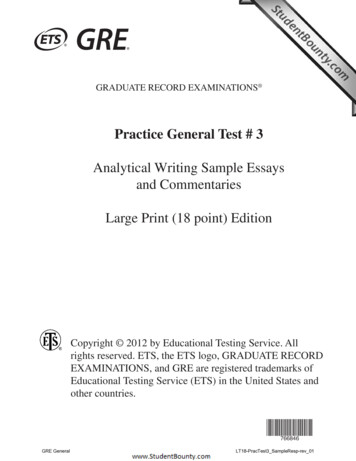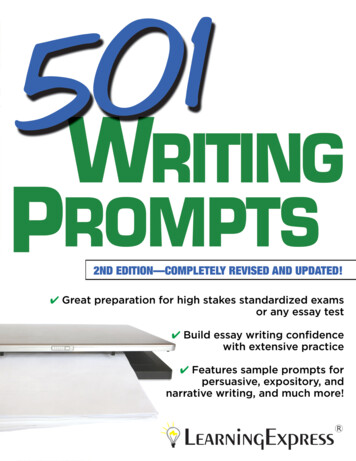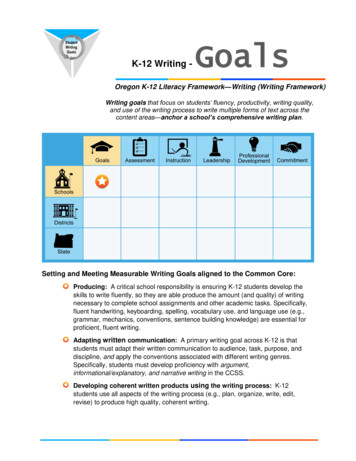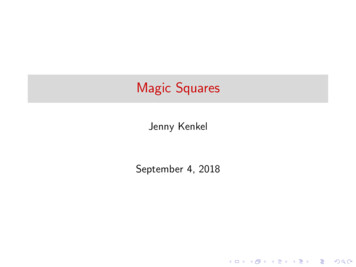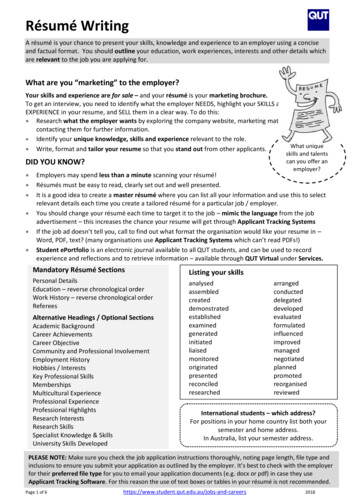
Transcription
Résumé WritingA résumé is your chance to present your skills, knowledge and experience to an employer using a conciseand factual format. You should outline your education, work experiences, interests and other details whichare relevant to the job you are applying for.What are you “marketing” to the employer?Your skills and experience are for sale – and your résumé is your marketing brochure.To get an interview, you need to identify what the employer NEEDS, highlight your SKILLS andEXPERIENCE in your resume, and SELL them in a clear way. To do this: Research what the employer wants by exploring the company website, marketing materials, orcontacting them for further information. Identify your unique knowledge, skills and experience relevant to the role.What unique Write, format and tailor your resume so that you stand out from other applicants.skills and talentscan you offer anemployer?DID YOU KNOW? Employers may spend less than a minute scanning your résumé!Résumés must be easy to read, clearly set out and well presented.It is a good idea to create a master résumé where you can list all your information and use this to selectrelevant details each time you create a tailored résumé for a particular job / employer.You should change your résumé each time to target it to the job – mimic the language from the jobadvertisement – this increases the chance your resume will get through Applicant Tracking SystemsIf the job ad doesn’t tell you, call to find out what format the organisation would like your resume in –Word, PDF, text? (many organisations use Applicant Tracking Systems which can’t read PDFs!)Student ePortfolio is an electronic journal available to all QUT students, and can be used to recordexperience and reflections and to retrieve information – available through QUT Virtual under Services.Mandatory Résumé SectionsListing your skillsPersonal DetailsEducation – reverse chronological orderWork History – reverse chronological ve Headings / Optional SectionsAcademic BackgroundCareer AchievementsCareer ObjectiveCommunity and Professional InvolvementEmployment HistoryHobbies / InterestsKey Professional SkillsMembershipsMulticultural ExperienceProfessional ExperienceProfessional HighlightsResearch InterestsResearch SkillsSpecialist Knowledge & SkillsUniversity Skills annedpromotedreorganisedreviewedInternational students – which address?For positions in your home country list both yoursemester and home address.In Australia, list your semester address.PLEASE NOTE: Make sure you check the job application instructions thoroughly, noting page length, file type andinclusions to ensure you submit your application as outlined by the employer. It’s best to check with the employerfor their preferred file type for you to email your application documents (e.g. docx or pdf) in case they useApplicant Tracking Software. For this reason the use of text boxes or tables in your résumé is not recommended.Page 1 of 18
Home AddressGeneral business practice is to include apostal/home address, however, someemployers have indicated that an emailaddress and contact number is sufficient.Sample RésuméName - use very clear text. A Titleis optional e.g. Ms, Mrs, MrPlease note this is an example only and is not theonly way to present your résumé. Do not copyrésumé templates - including this one!Email Address – make sureit is professional! Your QUTemail is recommended.Page 1Career Objective / Summary (Optional)Some research suggests that a careerobjective really doesn’t add value to yourrésumé. If you use one, it MUST be tailoredto the specific employer each time you applyfor a job. An alternative is a Summary - ashort paragraph summarising your key skillsand attributes aligned to the target position.EMILY SMITH552 Smart DriveCLEVERDALE QLD 4000emily@qut.edu.auPhone: 0421 123 456Phone NumberOnly include the number you want anemployer to call you on. Make sure you have aprofessional sounding voice mail message!Career Objective (Optional)Key Professional Skills (Optional)EDUCATION AND TRAININGDate - CurrentBachelor of Business majoring in Human Resource ManagementQueensland University of TechnologyGPA 5.4 on a 7 point scaleSpecial Interest Area – Change ManagementExpected completion date: DateKey Professional SkillsOptional. These are a good idea ifyou have a few years ofemployment experience or youhave had professional experiencethroughout your uni course. Tailor5-10 key skills that fit with what theemployer is asking for.University AchievementsDateQUT Business Student Prize for Outstanding ContributionsRelevant Projects and AssignmentsEducation and TrainingStart with your most recentstudy and place the title of yourcourse above the university.Remember to include the scalewith your GPA as this variesbetween universities.DateHR in Action project Utilised contemporary HR theories and practices Developed research skills and knowledge across a wide variety of contexts Presented findings of research in a formal written documentDateHR Management group project Managed HR issues such as change and redundancy Working with a multidisciplinary HR team Celebrated cultural diversity in the workforce Applied key HR principlesDateBusiness for the Next Generation Interpreting key business principles such as supply and demand Negotiated and problem solved business issues Researched and presented current information in an easy to understand formatUniversity InvolvementDatePresident of Human Resource ClubDateParticipant of the QUT Career Mentor SchemeDate - current Student Member of Management AustraliaMembershipsDateDateMember of Australian Institute of ManagementInducted as a member of the Golden Key International Student SocietyRésumé: Emily SmithMembershipsOptional. If you are a member of professionalassociations, include this information here.Only include relevant memberships that willadd value to your application.Page 2 of 6University SkillsDeveloped - Projectsand AssignmentsParticularly useful ifyou have limitedrelevant workexperience. A greatway to present thekey skills developedthrough universityproject that arerelevant to the jobyou’re applying for.Present the mostrecent one first andinclude only 3 to 4 dotpoints for each.Page 1 of 3University InvolvementOptional. This section is an opportunity to displayextra-curricular involvement at university. If youhave held leadership positions, consider how youmay wish to highlight this to potential careers2018
Multicultural ExperienceThis is a MUST for International Studentsand domestic students who haveextensive international experience, as itallows you to highlight your cross culturalskills and experiences. Simply dot pointkey details. Make links with the skills youacquired from the experiences to the jobyou are applying for.Page 2Employment History – paid and unpaidThis section may include Vacation/Internship/ Work Integrated Learning(WIL)/Work Experience as well as casual, fulltime or part-time jobs. In this section thereare two parts: career related positions andother. This gives you the chance to breakyour employment into those positions thatare related to the job for which you areapplying and those that are not.MULTICULTURAL EXPERIENCE Fluent in Mandarin and Cantonese: Outstanding communication skills from. Travelled extensively in Asia and Europe: Global understanding of finance issuessuch as . Lived and worked in Asia and America with ABC volunteer organisationEMPLOYMENT HISTORYCareer RelatedDate currentHuman Resource Officer (casual – 10 hours/week)Good Feeling Human ResourcesKey Accomplishments: Assisted to develop new policy on recruitment strategiesAlternative Wrote the company’s ‘New Invitations’ newsletterHeadings Increased staff attendance at optional training sessions on superannuation byRefer to Page 1Implementing advertising campaignDate from - Human Resource Assistant (vacation internship – 3 months)date toRather Large CompanyJob TitleUnless it is obvious tothe reader, take theopportunity to brieflyoutline the role. In thisexample, we haveadded two bulletpoints about thenature of the research.AccomplishmentsWhen listing accomplishments youmust be mindful of the duties andcontext of the role. Verify yourstatements - for example expandyour bullet points to outline thescale of the task such as:“Interviewed 100 inmates, guardsand administrative staff”.Key Accomplishments: Assisted to run enterprise bargaining workshop Updated employee database in relation to superannuation issues Secretary for Strategic Management MeetingsAchievements: Excellent feedback received for my organisation of several staff training daysand eventsOtherDate from - Customer Service Consultant (5 hours per week)date toSuper Yummy FoodKey Accomplishments: Undertook recruitment of casual staff Trained new and junior staff Prepared food and beverages to meet sales targets and company timeframesRésumé: Emily SmithPage 2 of 3Résumé Assistance and SupportYou can get constructive feedback on your résumé, cover letters and application documentsby dropping into a Résumé discussion group or accessing the online Résumé FeedbackService: submit your word document on QUT CareerHub - choose Resume Review in theForms section. You will receive your feedback within 5 working days.Page 3 of 18
Page 3EMPLOYMENT HISTORY (Continued)Voluntary/Community ExperienceDate Cafe attendantcurrentRosie’s Cafe Helping distribute food to disadvantaged peopleKey Accomplishments: Demonstrated compassion and a willingness to care for others Prepared food on a large scale Communication with diverse culturesCommunity InvolvementDateRed Cross Door Knock AppealDateBridge to Brisbane Fun RunHobbies and InterestsAnother optional extra. If you include itbe smart about what you include. If youare studying design, include any designinterests as hobbies. Be truthful as youmay be asked about your hobbies in aninterview, so you will need to be able totalk about these.Hobbies and Interests Debating Tennis Reading PaintingREFEREESMary LuiniSupervisorRather Large CompanyPhone: 07 3434 1234Mobile: 0401 123 456Email: Mary.Luini@rlc.com.auMark EdwardsDirectorGood Feeling Human ResourcesPhone: 07 3212 3123Mobile: 0402 789 456Email: mark.edwards@gfhr.com.auPhone NumbersHaving spacing in yourphone numbers makesthem easier to read.Résumé: Emily SmithSome things were never meant to be on an Australian résumé: Your date of birth/age Your marital status Your health status Your photo Anything not relevant to the position you are applying for Anything that could prevent you from being offered an interviewSome things really need to be on your résumé: Your name Phone Number Email Education and Training Qualifications Employment History – Paid and Unpaid Work (if you have it) At least 2 referees who can discuss your professional skills Evidence of relevant skillsPage 4 of 6Community InvolvementInclude the extra things youdo outside of uni that addvalue to the community youlive in, e.g. if you volunteerto collect money for theRSPCA, organise communityevents etc. Considerpresenting the skills you havedeveloped in these roles thatmay be relevant to theposition you are applying for.Page 3 of 3RefereesALWAYS the last thing onyour résumé. Referees arepeople who can becontacted to talk about yourprofessional fit for the jobyou have applied for – it isimportant to includereferees who can talk aboutyour professional skills.Include FULL contact detailsand make sure they areready and willing to providea telephone reference. Thereis no need to include apersonal referee.AVOID:Tables or graphs in yourresume - if the organisationis using Applicant TrackingSystems this informationmay be missed completely.To include your GPA?If your GPA is over 5 include it,however, if not, perhapsconsider if the employer needsto know it at this stage and ifhighlighting your key subjectsis more d-careers2018
What do I include in the. section?Education and TrainingList your current university study first (highlighting yourcourse name first, not the institution) followed by anyother study such as TAFE or other training courses. Includeyour majors and minors if they are relevant to the job. Donot list all your university subjects (units). You couldhighlight a few subjects if they are specifically related tothe position, and/or you did particularly well in them.Tracking TechnologiesResumes are sometimes “parsed” by applicant trackingsystems to pull out individual items. If the resume is notformatted properly, the resume parser may not be able topull specific information and therefore may not make it tothe employer’s desk.University Skills Developed - Projects andAssignmentsHave you been involved in substantial project orassignment work during your university studies? Selectprojects or assessment items that highlight key skills theemployer is looking for. Remember ALL students will havecompleted projects at university – what work relatedexperiences can you use to further illustrate practicalapplication of these skills in the workforce?Employment History (paid and unpaid work)It is important in this section to include your most recentpositions first and not to include lists of duties that do notadd value to the job for which you are applying. Onlyinclude 3 to 6 relevant key skills /tasks / accomplishmentsfor each job. The skills you learn and utilise in your casualemployment are transferable between jobs. Analyse whatyou do in your casual job and word your key skills /tasks/accomplishments to reflect transferable and useable skillsfor the job you are applying for. Have a look at theinformation on Personal Transferable Skills pplying-for-jobs/identify-your-skills forassistance.Résumé Tips. Use professional presentation which suits yourparticular industry Consistently use past tense, particularly under theaccomplishments and skills developed sections Sell your skills to an employer to gain an interview List IT /computer skills on your résumé if the jobdescription requires them Include your visa and/or work status if you are aninternational student Research the employer and tailor your résuméappropriately Your résumé can be between 2 and 4 pages ofrelevant information only.For each section of your résumé ask yourself Is this relevant?Could it be perceived negatively?Can I work this in a positive way?Does it add value to my application?Optional sections to includeCareer ObjectiveMust be tailored to specific employers or positionseach time you apply for a job.High SchoolPerhaps include captaincy positions or noteworthyachievementsKey Professional SkillsSuitable if you have had previous employment.Required Field Experience/ClinicalPlacementsYou need to include the date, duration, employer anda brief explanation of the skills you developed.MembershipsOnly include memberships to relevant organisations.Multicultural Experience/Other LanguagesIf you have one outstanding work-related reference, youmay wish to attach it as an appendix to your résumé.It’s important for graduates to attach a certifiedphotocopy of their most recent official AcademicRecord if required by the employer. Downloading acopy of your Academic History from your PersonalProfile on QUT Virtual may be acceptable to mostemployers as a substitute for an official AcademicRecord in the first instance.Need more help? Have a look at the online module on Résumé & Letters in Blackboard – click on Careerdevelopment programs from aining-and-workshopsYou could also attend a Résumé discussion group – you’ll find the schedule under events in CareerHub.Page 5 of 18
Résumé FAQsWhat if I don’t have any relevant experience?No doubt you’ll know the importance of gaining paid orunpaid work experience related to your industry. Ifyou’ve reached the end of your course and don’t havethis – don’t despair. Focus on what you have donerather than what you haven’t. Spend some timeidentifying industry-related or transferable skills fromwhat you have done while you’ve been at uni. Whatskills have you gained from your part time employment,your assignments, team projects, extracurricularactivities and other areas of your life? Check applying-for-jobs/identify-your-skills for help.Who can I list as professional referees?Professional referees can include current or recentemployers, supervisors from your work experience,practicum placements or voluntary work, your mentor,or someone with whom you have built a professionalrelationship. This could even be a lecturer or tutor. Theyare people who can comment on your professional oremployment related skills. Make sure you build andmaintain these relationships throughout your course soyou can ask these people to be referees for you whenyou are applying for jobs.What if I failed some of my subjects (units) during mycourse – how do I put this in my résumé?Remember that the purpose of your résumé is to getthe employer interested in meeting with you – so thinkcarefully about the information you include. Yourrésumé is not a “warts and all” documentation ofeverything you’ve done in your life until now. It’sselected, relevant information – targeted to thatparticular employer and job role. Aim to highlight yourstrengths, skills, experiences and achievements, andonly include information that reflects you in the mostpositive light. However, that does not mean you canalter the facts! If you have some failed units, include inyour résumé only units you have performed well in, ormake a general statement about your overall GPA ifthat is worth highlighting. Think about how to talkabout negative experiences in a positive way – youmight have failed a unit but from that experience youhave learnt better time management and study skills/when you have taken on too much and need to adjustyour work-life balance/ when you need to ask forsupport etc and your grades have improvedconsistently since then. In this way, perceivednegatives don’t stop you from getting an interview,and you will be able to promote the learning you havegained from the experience.How do I make my résumé stand out from all theothers that will be received?It is a good idea to include a photo?Everyone has their own idea of what makes a goodrésumé. What one employer thinks is a brilliant résumé,another may be unimpressed by. Get feedback fromemployers, lecturers and careers staff and work towardsa résumé that balances being different from others butstill within the comfort zone of employers. Experimentwith design features such as different fonts, watermarksand borders. If you use colours, make sure your résuméphotocopies clearly. Use bold, uppercase, underlining oritalics to highlight different sections of your résumé. Usebullet points where possible, rather than lengthy text.A photo can be a great way to personalise yourrésumé, but the risk is that you could be discriminatedagainst based on your appearance, i.e. being perceivedas too young / old / serious / flighty / inexperiencedand so on. You could miss out on an interview basedon someone’s, possibly inaccurate, perception of you.If you like the idea of a photo, perhaps take a separatecopy of your résumé with a photo included, when youmeet with an employer. This way they can meet you,hear what you have to say, and have a résumé with aphoto to remind them of who you are.What is the difference between a résumé and a CV?Do I need to include my interests / extracurricularactivities?A résumé is the summary document that employers areseeking, and a CV (curriculum vitae) is a more detaileddocument often used where extensive professionalexperience is required.If I’ve had jobs that involved similar skills – do I have tolist them separately for each job?Try to make your résumé interesting and easy to readfor potential employers. Rather than repeating similarduties/responsibilities/ skills held for similar positionsthat you have held, think about listing each position andthen do a summary of skills under this.Page 6 of 6As with any part of your résumé, only includeinformation that reflects positively on you in relationto the position you are applying for. Your interests andextracurricular activities can be a great way topersonalise your résumé and present you as a wellrounded applicant. Think carefully about what yourinterests and activities say about you and be preparedto describe them further at an careers2018
Resume: Emily Applicant Page 3 of 3 Education and Training Sample Résumé Please note this is an example only and is not the only way to present your résumé. Do not copy résumé templates - including this one! Your marital status Your health status Your photo Anything not relevant to the position you are applying for

